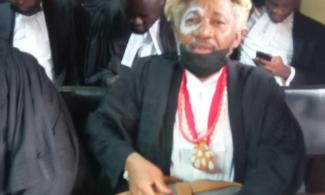
SaharaReporters had reported that last Thursday, Omirhobo dressed in a similar way to Supreme Court, Abuja.
A human rights lawyer and activist, Barrister Malcolm Omirhobo, Monday caused a stir at a Federal High Court in Lagos when he appeared in a combination of court dress and attire said to be worn by adherents of ‘Olokun’, the ruler of all bodies of water and other water deities.
SaharaReporters had reported that last Thursday, Omirhobo dressed in a similar way to Supreme Court, Abuja.

The lawyer, who hails from Delta State, last week said he dressed to court in that manner to exercise his fundamental human rights following the judgement of the Supreme Court that allows every Nigerian to express their way of worship and the use of hijab in schools and public places.
In an interview, he described the garb as one usually worn by Olokun worshippers.
It was gathered that his colleagues in the Lagos court looked amused as he took his seat to await the day’s proceedings to commence.
However, he had earlier in an interview with Sunday PUNCH said that he was waiting to be questioned by a judge over his attire.
He had said, "It is in response to the Supreme Court judgment of Friday (two weeks ago) against the Lagos State Government that female Muslim pupils can now wear hijabs to school. I am being satirical; I am trying to comply with that judgment.
"By that judgment, they are saying that wearing a hijab is a mode of worship by female Muslim pupils and any attempt to deprive them of that will amount to the violation of their fundamental human right, freedom of thought, conscience and religion, and stopping or harassing them will amount to a violation of their right to dignity of their persons.
"It is not just an Islamic or private school; it is a public school. Nigeria is a multi-religious society. We have the traditional worshippers, Christians, Muslims, Rastafarians, and Buddhists. The judgement implies that as long as we all have rights, we all can be allowed to go to our places of work or school in our religious attire."
While he said that he was not being disrespectful to the court, he explained that he is an African man.
He added, "I am waiting to be told that I am not properly dressed. They should tell me what is proper dressing, according to the Constitution of Nigeria. Is there anything in the Legal Practitioners Act that defines the kind of dress I must wear?
"Whatever we wear is based on the convention that we should wear black and white. Can convention supersede the constitution? The law says one (law graduate) will be called to the Bar, and wear a wig and gown. Did the law say I should not wear a feather on my head?
"Did it say I must wear black and white? The law didn’t say so. So, what we are wearing is just about culture, and culture does not supersede the constitution. So, that just shows there is a lacuna in our laws. They need to look at them critically. Nobody should tell me what is decent about dressing."